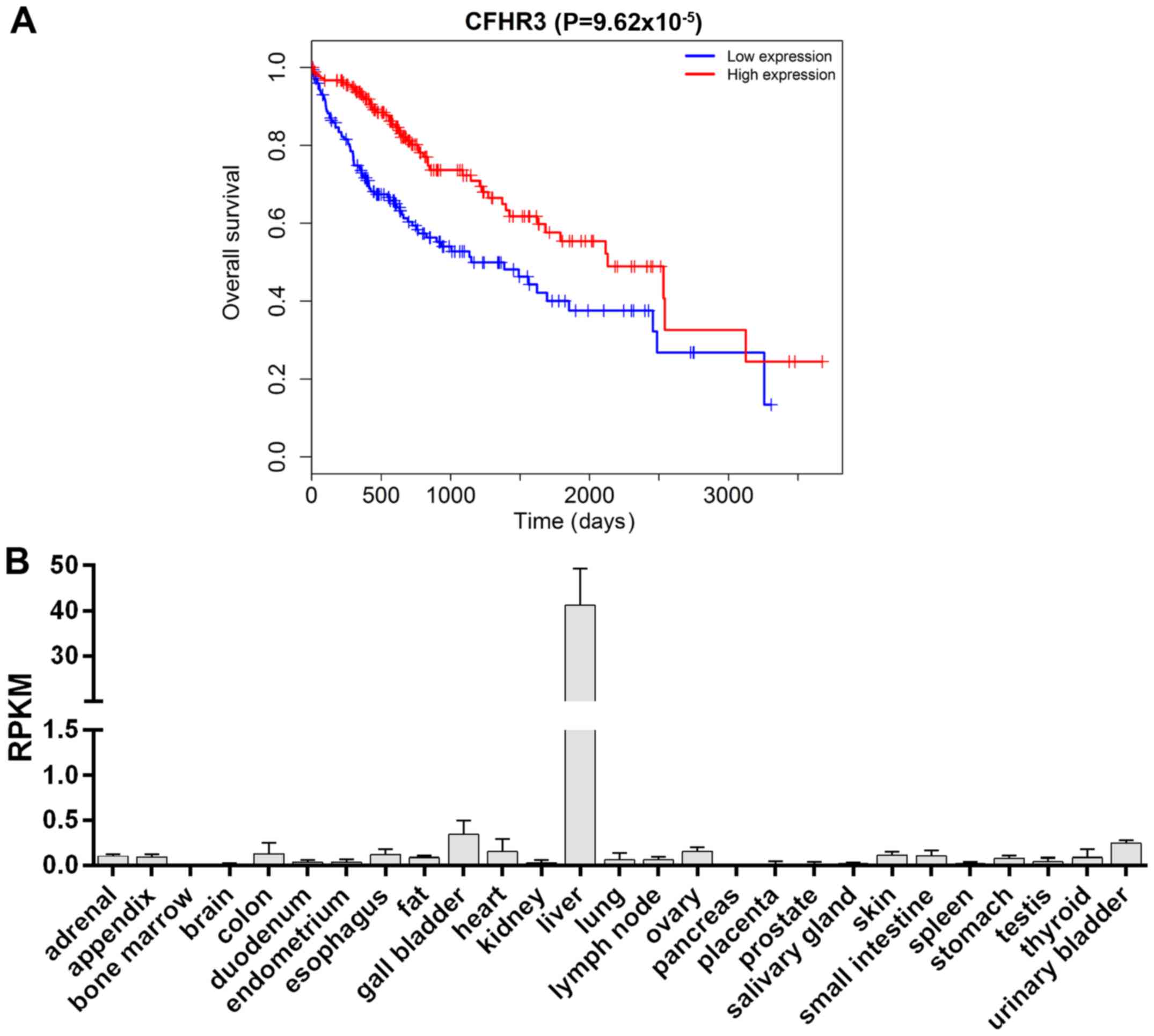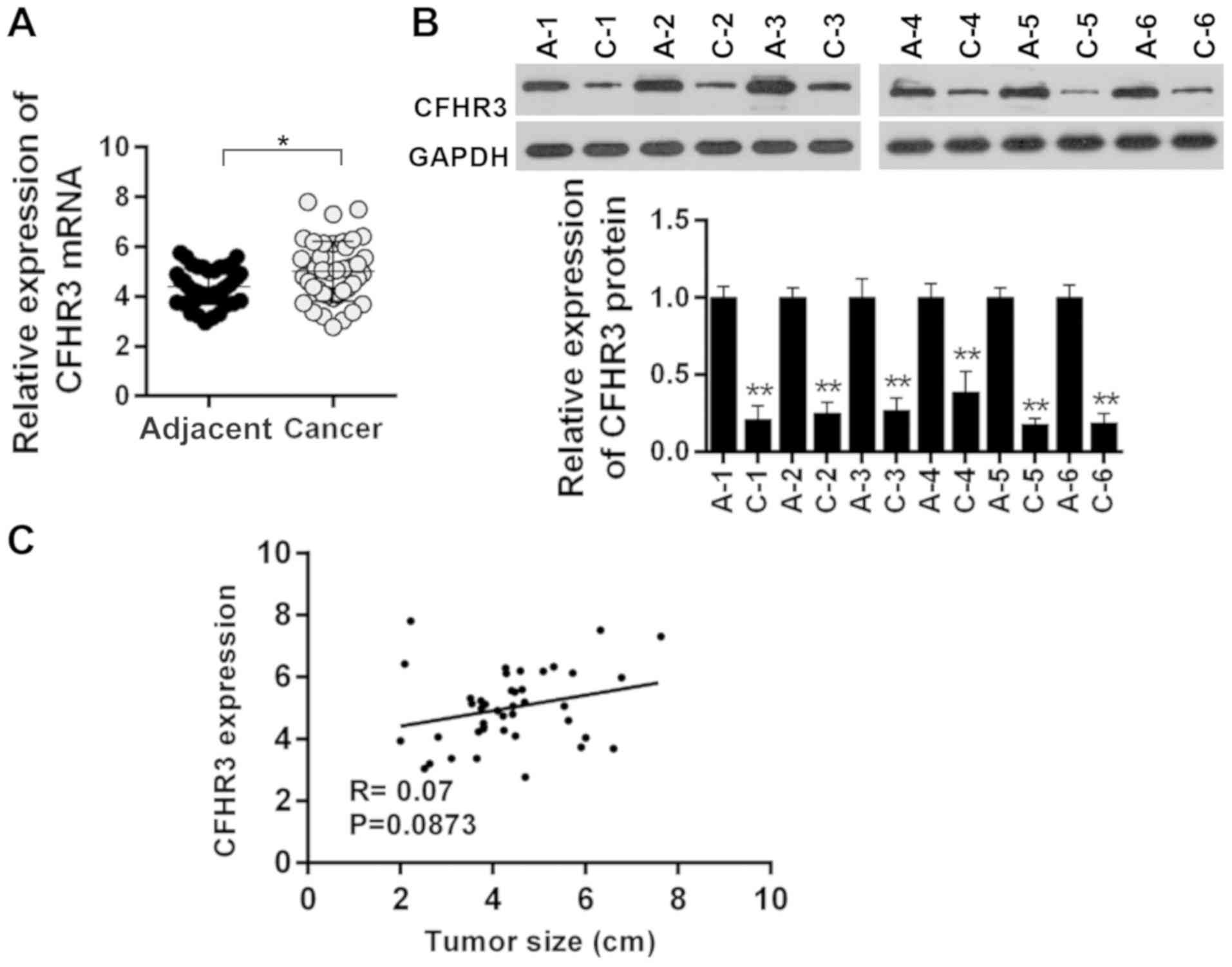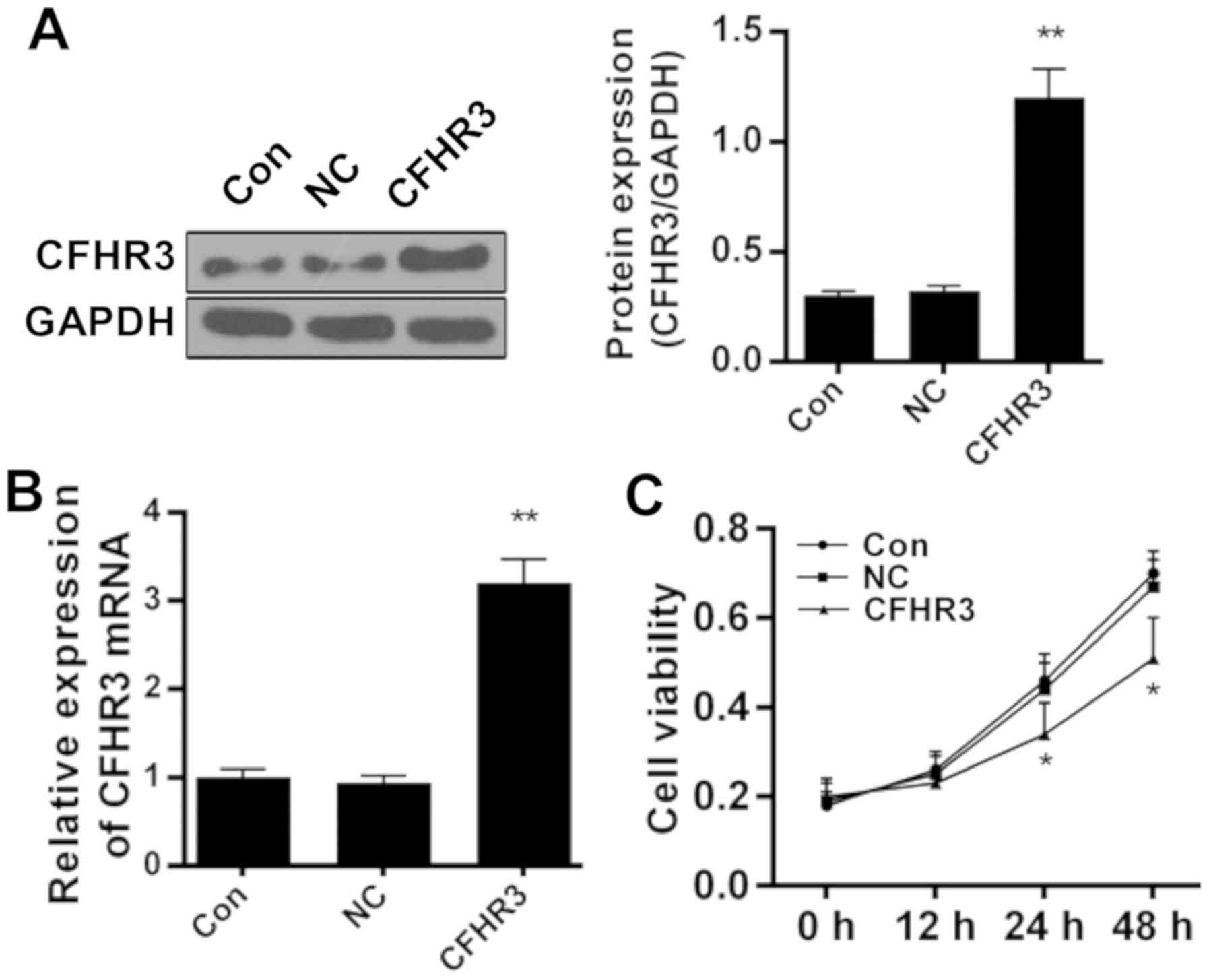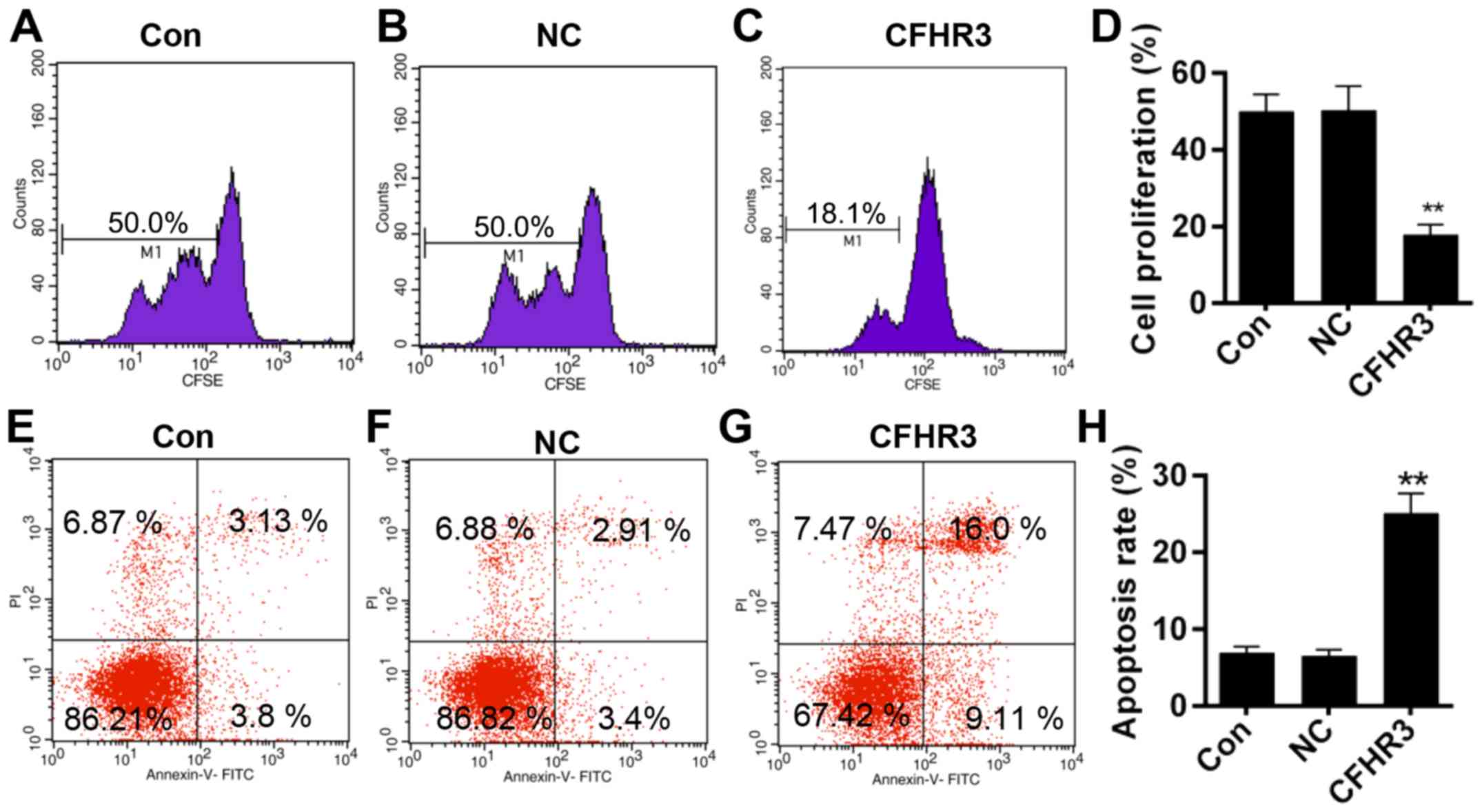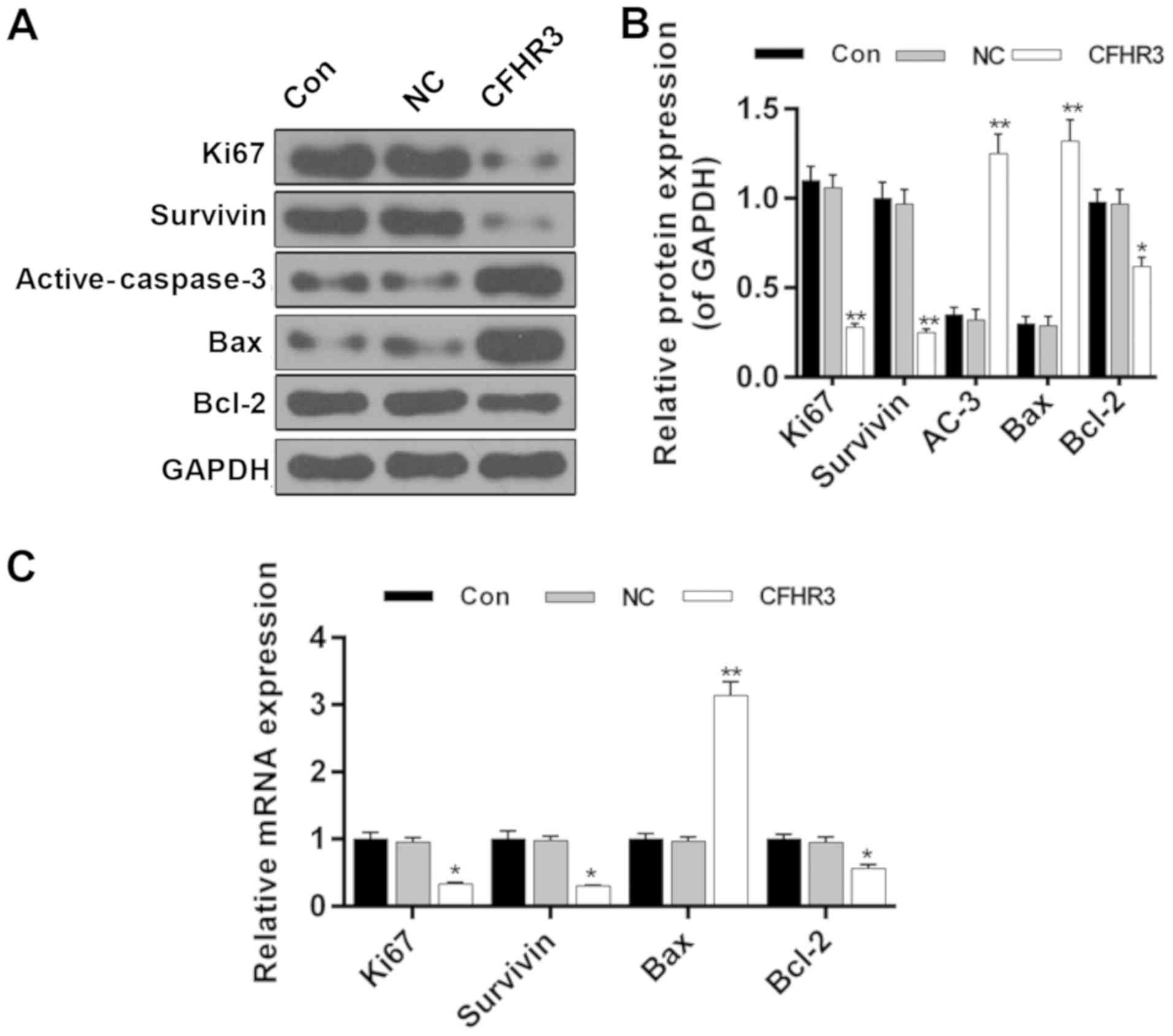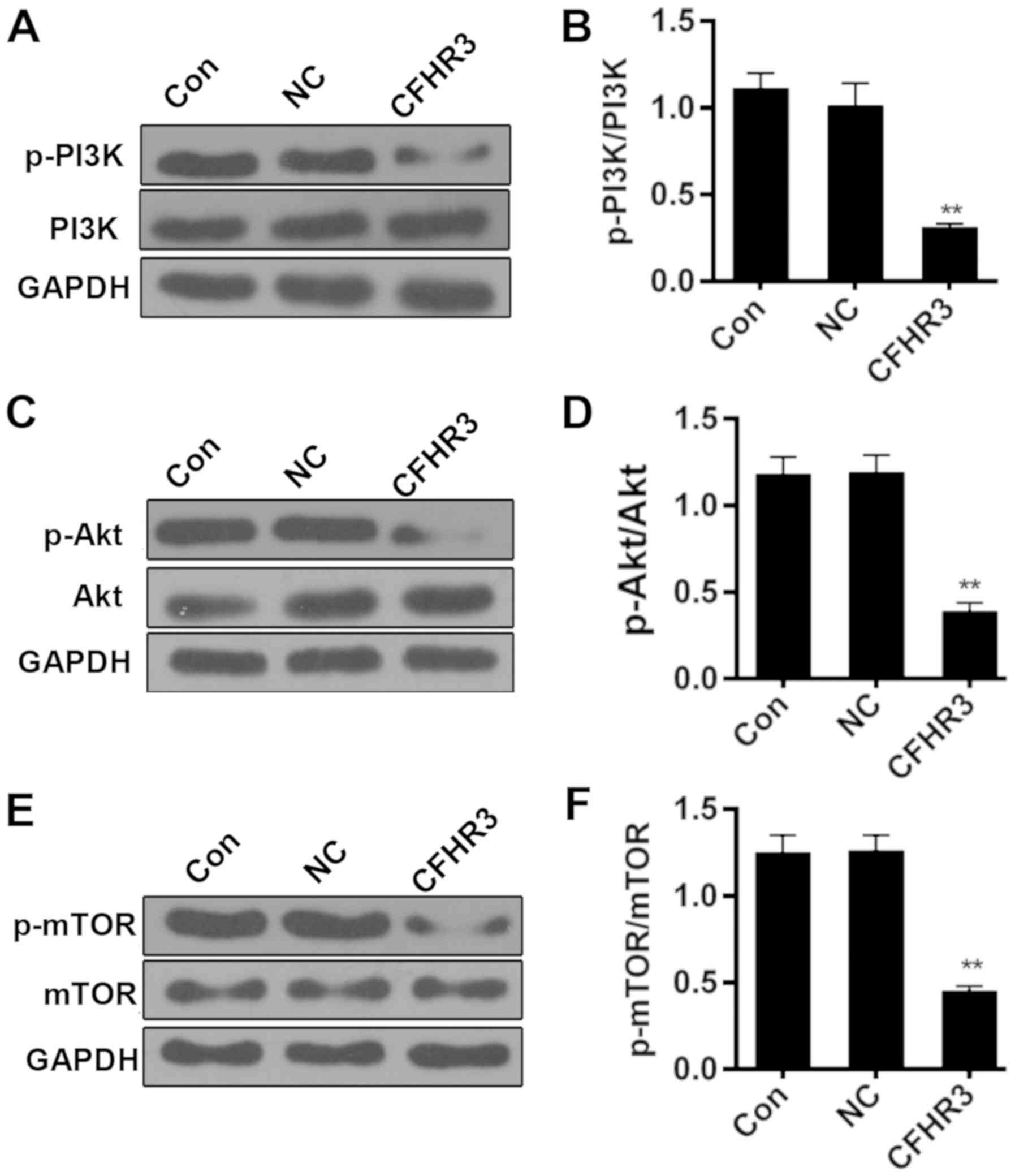|
1
|
Torre LA, Bray F, Siegel RL, Ferlay J,
Lortet-Tieulent J and Jemal A: Global cancer statistics, 2012. CA
Cancer J Clin. 65:87–108. 2015. View Article : Google Scholar : PubMed/NCBI
|
|
2
|
European Association For The Study Of The
Liver; European Organisation For Research and Treatment Of Cancer,
. EASL-EORTC clinical practice guidelines: Management of
hepatocellular carcinoma. J Hepatol. 56:908–943. 2012. View Article : Google Scholar : PubMed/NCBI
|
|
3
|
Chan SL, Wong AM, Lee K, Wong N and Chan
AK: Personalized therapy for hepatocellular carcinoma: Where are we
now? Cancer Treat Rev. 45:77–86. 2016. View Article : Google Scholar : PubMed/NCBI
|
|
4
|
Liu J and Fan D: Hepatitis B in China.
Lancet. 369:1582–1583. 2007. View Article : Google Scholar : PubMed/NCBI
|
|
5
|
Mohd Hanafiah K, Groeger J, Flaxman AD and
Wiersma ST: Global epidemiology of hepatitis C virus infection: New
estimates of age-specific antibody to HCV seroprevalence.
Hepatology. 57:1333–1342. 2013. View Article : Google Scholar : PubMed/NCBI
|
|
6
|
Sartorius K, Sartorius B, Aldous C,
Govender PS and Madiba TE: Global and country underestimation of
hepatocellular carcinoma (HCC) in 2012 and its implications. Cancer
Epidemiol. 39:284–290. 2015. View Article : Google Scholar : PubMed/NCBI
|
|
7
|
Fagerberg L, Hallstrom BM, Oksvold P,
Kampf C, Djureinovic D, Odeberg J, Habuka M, Tahmasebpoor S,
Danielsson A, Edlund K, et al: Analysis of the human
tissue-specific expression by genome-wide integration of
transcriptomics and antibody-based proteomics. Mol Cell Proteomics.
13:397–406. 2014. View Article : Google Scholar : PubMed/NCBI
|
|
8
|
Zipfel PF, Skerka C, Hellwage J, Jokiranta
ST, Meri S, Brade V, Kraiczy P, Noris M and Remuzzi G: Factor H
family proteins: On complement, microbes and human diseases.
Biochem Soc Trans. 30:971–978. 2002. View Article : Google Scholar : PubMed/NCBI
|
|
9
|
Hellwage J, Jokiranta TS, Koistinen V,
Vaarala O, Meri S and Zipfel PF: Functional properties of
complement factor H-related proteins FHR-3 and FHR-4: Binding to
the C3d region of C3b and differential regulation by heparin. FEBS
Lett. 462:345–352. 1999. View Article : Google Scholar : PubMed/NCBI
|
|
10
|
McRae JL, Duthy TG, Griggs KM, Ormsby RJ,
Cowan PJ, Cromer BA, McKinstry WJ, Parker MW, Murphy BF and Gordon
DL: Human factor H-related protein 5 has cofactor activity,
inhibits C3 convertase activity, binds heparin and C-reactive
protein, and associates with lipoprotein. J Immunol. 174:6250–6256.
2005. View Article : Google Scholar : PubMed/NCBI
|
|
11
|
Kotarsky H, Hellwage J, Johnsson E, Skerka
C, Svensson HG, Lindahl G, Sjobring U and Zipfel PF: Identification
of a domain in human factor H and factor H-like protein-1 required
for the interaction with streptococcal M proteins. J Immunol.
160:3349–3354. 1998.PubMed/NCBI
|
|
12
|
Appel GB, Cook HT, Hageman G, Jennette JC,
Kashgarian M, Kirschfink M, Lambris JD, Lanning L, Lutz HU, Meri S,
et al: Membranoproliferative glomerulonephritis type II (dense
deposit disease): An update. J Am Soc Nephrol. 16:1392–1403. 2005.
View Article : Google Scholar : PubMed/NCBI
|
|
13
|
Venables JP, Strain L, Routledge D, Bourn
D, Powell HM, Warwicker P, Diaz-Torres ML, Sampson A, Mead P, Webb
M, et al: Atypical haemolytic uraemic syndrome associated with a
hybrid complement gene. PLoS Med. 3:e4312006. View Article : Google Scholar : PubMed/NCBI
|
|
14
|
Zipfel PF, Edey M, Heinen S, Jozsi M,
Richter H, Misselwitz J, Hoppe B, Routledge D, Strain L, Hughes AE,
et al: Deletion of complement factor H-related genes CFHR1 and
CFHR3 is associated with atypical hemolytic uremic syndrome. PLoS
Genet. 3:e412007. View Article : Google Scholar : PubMed/NCBI
|
|
15
|
Monteferrante G, Brioschi S, Caprioli J,
Pianetti G, Bettinaglio P, Bresin E, Remuzzi G and Noris M: Genetic
analysis of the complement factor H related 5 gene in haemolytic
uraemic syndrome. Mol Immunol. 44:1704–1708. 2007. View Article : Google Scholar : PubMed/NCBI
|
|
16
|
Hughes AE, Orr N, Esfandiary H,
Diaz-Torres M, Goodship T and Chakravarthy U: A common CFH
haplotype, with deletion of CFHR1 and CFHR3, is associated with
lower risk of age-related macular degeneration. Nat Genet.
38:1173–1177. 2006. View
Article : Google Scholar : PubMed/NCBI
|
|
17
|
Hageman GS, Hancox LS, Taiber AJ, Gehrs
KM, Anderson DH, Johnson LV, Radeke MJ, Kavanagh D, Richards A,
Atkinson J, et al: Extended haplotypes in the complement factor H
(CFH) and CFH-related (CFHR) family of genes protect against
age-related macular degeneration: Characterization, ethnic
distribution and evolutionary implications. Ann Med. 38:592–604.
2006. View Article : Google Scholar :
|
|
18
|
Kavanagh D, Richards A and Atkinson J:
Complement regulatory genes and hemolytic uremic syndromes. Annu
Rev Med. 59:293–309. 2008. View Article : Google Scholar : PubMed/NCBI
|
|
19
|
Kinders R, Jones T, Root R, Bruce C,
Murchison H, Corey M, Williams L, Enfield D and Hass GM: Complement
factor H or a related protein is a marker for transitional cell
cancer of the bladder. Clin Cancer Res. 4:2511–2520.
1998.PubMed/NCBI
|
|
20
|
Junnikkala S, Jokiranta TS, Friese MA,
Jarva H, Zipfel PF and Meri S: Exceptional resistance of human H2
glioblastoma cells to complement-mediated killing by expression and
utilization of factor H and factor H-like protein 1. J Immunol.
164:6075–6081. 2000. View Article : Google Scholar : PubMed/NCBI
|
|
21
|
Corey MJ, Kinders RJ, Poduje CM, Bruce CL,
Rowley H, Brown LG, Hass GM and Vessella RL: Mechanistic studies of
the effects of anti-factor H antibodies on complement-mediated
lysis. J Biol Chem. 275:12917–12925. 2000. View Article : Google Scholar : PubMed/NCBI
|
|
22
|
Fedarko NS, Fohr B, Robey PG, Young MF and
Fisher LW: Factor H binding to bone sialoprotein and osteopontin
enables tumor cell evasion of complement-mediated attack. J Biol
Chem. 275:16666–16672. 2000. View Article : Google Scholar : PubMed/NCBI
|
|
23
|
Jozsi M, Manuelian T, Heinen S, Oppermann
M and Zipfel PF: Attachment of the soluble complement regulator
factor H to cell and tissue surfaces: Relevance for pathology.
Histol Histopathol. 19:251–258. 2004.PubMed/NCBI
|
|
24
|
Fedarko NS, Jain A, Karadag A, Van Eman MR
and Fisher LW: Elevated serum bone sialoprotein and osteopontin in
colon, breast, prostate, and lung cancer. Clin Cancer Res.
7:4060–4066. 2001.PubMed/NCBI
|
|
25
|
Cui L, Fu J, Pang JC, Qiu ZK, Liu XM, Chen
FR, Shi HL, Ng HK and Chen ZP: Overexpression of IL-7 enhances
cisplatin resistance in glioma. Cancer Biol Ther. 13:496–503. 2012.
View Article : Google Scholar : PubMed/NCBI
|
|
26
|
Sabatini DM: mTOR and cancer: Insights
into a complex relationship. Nat Rev Cancer. 6:729–734. 2006.
View Article : Google Scholar : PubMed/NCBI
|
|
27
|
Ayuso C, Rimola J, Vilana R, Burrel M,
Darnell A, García-Criado Á, Bianchi L, Belmonte E, Caparroz C,
Barrufet M, Bruix J and Brú C: Diagnosis and staging of
hepatocellular carcinoma (HCC): current guidelines. Eur J Radiol.
101:72–81. 2018. View Article : Google Scholar : PubMed/NCBI
|
|
28
|
Livak KJ and Schmittgen TD: Analysis of
relative gene expression data using real-time quantitative PCR and
the 2(-Delta Delta C(T)) method. Methods. 25:402–408. 2001.
View Article : Google Scholar : PubMed/NCBI
|
|
29
|
Hoefel D, Grooby WL, Monis PT, Andrews S
and Saint CP: A comparative study of carboxyfluorescein diacetate
and carboxyfluorescein diacetate succinimidyl ester as indicators
of bacterial activity. J Microbiol Methods. 52:379–388. 2003.
View Article : Google Scholar : PubMed/NCBI
|
|
30
|
Gharavi AG, Kiryluk K, Choi M, Li Y, Hou
P, Xie J, Sanna-Cherchi S, Men CJ, Julian BA, Wyatt RJ, et al:
Genome-wide association study identifies susceptibility loci for
IgA nephropathy. Nat Genet. 43:321–327. 2011. View Article : Google Scholar : PubMed/NCBI
|
|
31
|
Munch J, Bachmann A, Grohmann M, Mayer C,
Kirschfink M, Lindner TH, Bergmann C and Halbritter J: Effective
immunosuppressive management with belatacept and eculizumab in
post-transplant aHUS due to a homozygous deletion of CFHR1/CFHR3
and the presence of CFH antibodies. Clin Kidney J. 10:742–746.
2017. View Article : Google Scholar : PubMed/NCBI
|
|
32
|
Bakri NM, Ramachandran V, Kee HF, Subrayan
V, Isa H, Ngah NF, Mohamad NA, Mooi CS, Mun CY, Ismail P, et al:
Association of copy number variations in complement factor
H-Related genes among age-related macular degenerative subjects.
Kaohsiung J Med Sci. 33:602–608. 2017. View Article : Google Scholar : PubMed/NCBI
|
|
33
|
Junnikkala S, Hakulinen J, Jarva H,
Manuelian T, Bjorge L, Butzow R, Zipfel PF and Meri S: Secretion of
soluble complement inhibitors factor H and factor H-like protein
(FHL-1) by ovarian tumour cells. Br J Cancer. 87:1119–1127. 2002.
View Article : Google Scholar : PubMed/NCBI
|
|
34
|
Khan FH, Pandian V, Ramraj S, Natarajan M,
Aravindan S, Herman TS and Aravindan N: Acquired genetic
alterations in tumor cells dictate the development of high-risk
neuroblastoma and clinical outcomes. BMC Cancer. 15:5142015.
View Article : Google Scholar : PubMed/NCBI
|
|
35
|
Hanazaki K, Kajikawa S, Shimozawa N,
Mihara M, Shimada K, Hiraguri M, Koide N, Adachi W and Amano J:
Survival and recurrence after hepatic resection of 386 consecutive
patients with hepatocellular carcinoma. J Am Coll Surg.
191:381–388. 2000. View Article : Google Scholar : PubMed/NCBI
|
|
36
|
Poon RT, Fan ST, Lo CM, Ng IO, Liu CL, Lam
CM and Wong J: Improving survival results after resection of
hepatocellular carcinoma: A prospective study of 377 patients over
10 years. Ann Surg. 234:63–70. 2001. View Article : Google Scholar : PubMed/NCBI
|
|
37
|
Bosch J and Forns X: Therapy. Statins and
liver disease: From concern to ‘wonder’ drugs? Nat Rev
Gastroenterol Hepatol. 12:320–321. 2015. View Article : Google Scholar : PubMed/NCBI
|
|
38
|
Zhang H, Gao C, Fang L, Zhao HC and Yao
SK: Metformin and reduced risk of hepatocellular carcinoma in
diabetic patients: A meta-analysis. Scand J Gastroenterol.
48:78–87. 2013. View Article : Google Scholar : PubMed/NCBI
|
|
39
|
Forones NM, Carvalho AP, Giannotti-Filho
O, Lourenço LG and Oshima CT: Cell proliferation and apoptosis in
gastric cancer and intestinal metaplasia. Arq Gastroenterol.
42:30–44. 2005. View Article : Google Scholar : PubMed/NCBI
|
|
40
|
Ambrosini G, Adida C and Altieri DC: A
novel anti-apoptosis gene, survivin, expressed in cancer and
lymphoma. Nat Med. 3:917–921. 1997. View Article : Google Scholar : PubMed/NCBI
|
|
41
|
Altieri DC: Survivin, cancer networks and
pathway-directed drug discovery. Nat Rev Cancer. 8:61–70. 2008.
View Article : Google Scholar : PubMed/NCBI
|
|
42
|
Choudhary GS, Al-Harbi S and Almasan A:
Caspase-3 activation is a critical determinant of genotoxic
stress-induced apoptosis. Methods Mol Biol. 1219:1–9. 2015.
View Article : Google Scholar : PubMed/NCBI
|
|
43
|
Newell P, Toffanin S, Villanueva A, Chiang
DY, Minguez B, Cabellos L, Savic R, Hoshida Y, Lim KH,
Melgar-Lesmes P, et al: Ras pathway activation in hepatocellular
carcinoma and anti-tumoral effect of combined sorafenib and
rapamycin in vivo. J Hepatol. 51:725–733. 2009. View Article : Google Scholar : PubMed/NCBI
|
|
44
|
Villanueva A, Toffanin S and Llovet JM:
Linking molecular classification of hepatocellular carcinoma and
personalized medicine: Preliminary steps. Curr Opin Oncol.
20:444–453. 2008. View Article : Google Scholar : PubMed/NCBI
|
|
45
|
Wang J, Ouyang C, Chen X, Fu B, Lu Y and
Hong Q: Effect of Jak2 kinase inhibition on Stat1 and Stat3
activation and apoptosis of tubular epithelial cells induced by ATP
depletion/recovery. J Nephrol. 21:919–923. 2008.PubMed/NCBI
|
|
46
|
Quentmeier H, Geffers R, Jost E, Macleod
RA, Nagel S, Rohrs S, Romani J, Scherr M, Zaborski M and Drexler
HG: SOCS2: Inhibitor of JAK2V617F-mediated signal transduction.
Leukemia. 22:2169–2175. 2008. View Article : Google Scholar : PubMed/NCBI
|
|
47
|
Herbst A and Kolligs FT: Wnt signaling as
a therapeutic target for cancer. Methods Mol Biol. 361:63–91.
2007.PubMed/NCBI
|
|
48
|
Yang J, Pi C and Wang G: Inhibition of
PI3K/Akt/mTOR pathway by apigenin induces apoptosis and autophagy
in hepatocellular carcinoma cells. Biomed Pharmacother.
103:699–707. 2018. View Article : Google Scholar : PubMed/NCBI
|
|
49
|
Zhao L, Li C, Liu F, Zhao Y, Liu J, Hua Y,
Liu J, Huang J and Ge C: A blockade of PD-L1 produced antitumor and
antimetastatic effects in an orthotopic mouse pancreatic cancer
model via the PI3K/Akt/mTOR signaling pathway. Onco Targets Ther.
10:2115–2126. 2017. View Article : Google Scholar : PubMed/NCBI
|
|
50
|
Wang X, Zeng J, Wang L, Zhang X, Liu Z,
Zhang H and Dong J: Overexpression of microRNA-133b is associated
with the increased survival of patients with hepatocellular
carcinoma after curative hepatectomy: Involvement of the
EGFR/PI3K/Akt/mTOR signaling pathway. Oncol Rep. 38:141–150. 2017.
View Article : Google Scholar : PubMed/NCBI
|















